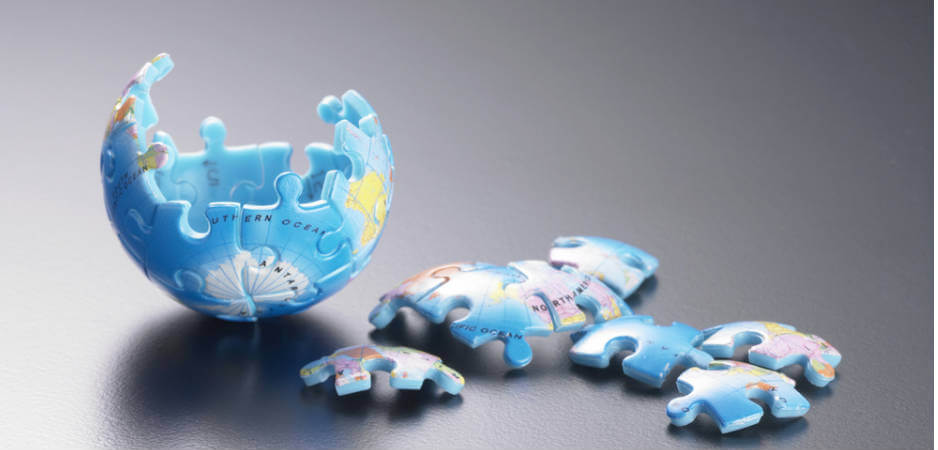Trump leaves for Asia with no clear ideas, giving Xi the perfect opportunity to outflank the US by resuming normal ties with South Korea.
This week, New York suffered its first terror attack since the fateful day of September 11, 2001. A 29-year-old immigrant from Uzbekistan plowed his truck into people on a cycle path. Eight died and 11 were seriously hurt. Police shot the terrorist, took him to hospital and is keeping him in custody. Europe has already experienced such attacks, but it is a first in the US. President Donald Trump tweeted that he would not allow the Islamic State “to return, or enter, our country after defeating them in the Middle East and elsewhere. Enough!”
This attack might have conveniently diverted attention from the first indictments against Trump’s associates. Paul Manafort and Rick Gates are facing 12 counts, including conspiracy to launder money and conspiracy against the US. More importantly, George Papadopoulos has pleaded guilty to lying about his contacts with Russian nationals and connected individuals during the time he worked on the Trump campaign.
Even as Trump’s rollercoaster ride goes on, his Twitter account was disabled for 11 minutes. Jack Dorsey, the company’s big boss, claimed a disgruntled contractor on the last day at work took Trump’s account down. It demonstrates that even high-profile accounts are not terribly secure in the world of social media. This occurred hot on the heels of a grilling for social media bigwigs in Washington, DC. Lawmakers grilled the general counsels of Google, Facebook and Twitter about Russian interference in the 2016 election. Colin Stretch, Mark Zuckerberg’s slick Harvard-trained consiglieri, batted away their questions with contemptuous ease.
Stretch refused to cede an inch to an enraged but impotent Senator Al Franken. Stretch refused to rule out taking North Korean cash and left Franken seething in rage. Trevor Noah of The Daily Show put it most aptly: “Facebook loves money so much that they are not willing to put a limit on who they take it from.” He posed a critical question that citizens across the world from Myanmar to the US have to answer one day: “Would you guys let Hitler buy ads on Facebook?”
As Noah pointed out, Facebook made more than $10 billion in revenue last quarter, raking in more than $100 million a day. In the current system, Zuckerberg has a fiduciary duty to his shareholders to maximize profits. He might not like the idea of Hitler buying ads on Facebook. However, his core incentive is to grab attention of as many people for as long as possible. Then, Zuckerberg is supposed to monetize that attention through selling ads. Therefore, Stretch cannot set a precedent of refusing to sell ads to anyone, including the North Koreans.
On October 9, none other than Pierre Omidyar, an internet entrepreneur-turned-philanthropist, called social media “a direct threat to democracy.” On November 4, The Economist argued for social responsibility on the part of social media. It examined many remedies, including those imposed by laws or regulators, to temper a “business-model designed to monopolize attention.” At the moment, no one has the power to rein in the Harvard mafia running Facebook. They have too much power, own a ton of money and employ innumerable lobbyists, making them a lot more potent than the likes of Franken.
It seems Chinese President Xi Jinping is the only person powerful enough to summon the head honchos of Silicon Valley. Zuckerberg of Facebook and Tim Cook of Apple turned up in Beijing for a meeting of the advisory board of the Tsinghua School of Economics and Management. Apple manufactures and sells its products in the Middle Kingdom. It makes sense for Cook to kowtow to Xi. Zuckerberg is prostrating himself before Xi in the hope that Facebook will emerge from behind the Great Firewall to access another billion-plus users in Xi’s land.
 Of all the developments this week, it is Xi’s overture to South Korean President Moon Jae-in that takes center stage. Even as Trump embarks on a marathon Asia tour, Xi has stolen his thunder by normalizing ties between Beijing and Seoul.
Of all the developments this week, it is Xi’s overture to South Korean President Moon Jae-in that takes center stage. Even as Trump embarks on a marathon Asia tour, Xi has stolen his thunder by normalizing ties between Beijing and Seoul.
CHINA-SOUTH KOREA RAPPROCHEMENT
The March 12 edition of The World This Week pointed out how “the Middle Kingdom [was] irate with South Korea for allowing the US to deploy the Terminal High Altitude Area Defense (THAAD) missile shield.” Beijing feared that THAAD’s powerful radar to detect missiles would penetrate parts of its northeast, allowing the US to spy on China’s missile tests and undermining its nuclear deterrent. Hence, Xi’s government turned the screws on South Korean businesses that rely on Chinese consumers.
Before the THAAD dispute, relations between Beijing and Seoul flourished despite South Korea’s historic ties to the US. Even today, over 24,000 US troops are stationed in the Korean Peninsula. Militarily, South Korea might be allied with the US, but its biggest trading partner is China. Therefore, the Middle Kingdom’s de facto boycott of South Korean firms decimated tourism, retail, cosmetics and entertainment sectors in its tiny neighbor. Apparently, the loss might have been as high as $7.5 billion, which is 0.5% of its GDP.
The economic fallout of the spat over THAAD contributed to the fall of Park Geun-hy, the scandalous president who was impeached in March. It led to Moon’s victory in May. Notably, South Korea’s president has opposed THAAD in the past and was determined to reset relations with his giant neighbor. After last week’s elevation to the pantheon of all-time greats, Xi has extended an olive branch to Moon.
The Chinese foreign ministry has declared that South Korea recognized China’s concerns over THAAD and made it clear the deployment was not aimed at any third country and did not harm China’s strategic security interests. Yet it also said “its position on the THAAD issue is clear, consistent and has not changed.” It is clear that South Korea will have to address some if not all Chinese concerns on THAAD.
In a sign of how much the export-oriented South Korean economy depends on China, Seoul’s Kospi index rose to hit record heights as soon as the two countries normalized relations. Shares in companies such as Asiana Airlines and Lotte Shopping went up by 3.6% and 7.14% respectively. The May 14 edition of The World This Week took the view that Moon’s biggest challenge was reforming the economy. Rapprochement with China will give him more breathing space to push through reforms, many of which will inevitably be painful.
Rapprochement benefits not only Moon but also Xi. As the September 3 edition of The World This Week pointed out, China is in a bind thanks to North Korea’s intemperate actions. It is an open secret that there is no love lost between Xi and North Korean leader Kim Jong-un, who “has now overseen more than 80 missile tests, a greater number than his father and grandfather managed together.” This year, he has used a banned chemical weapon to murder his half-brother and detonated a powerful nuclear bomb. The timing of the explosion was a slap in the face of Xi because he was hosting the BRICS summit. In this infernally multilayered game of geopolitical Go, Xi needs a friendly Moon to ratchet up the pressure on pesky Kim.
The previous edition of The World This Week argued that Shinzo Abe’s resounding victory in the Japanese elections will lead to increasing tensions between Japan and China. Abe is a princeling and a nationalist who aims to boost Japan’s military and make it a normal country. Facing an aging population and growing debt, he is seeking refuge in the arms of Trump. Under Abe, the Japanese navy has joined its Indian and American counterparts in tri-nation exercises. Thankfully for Xi, Abe has offended Korean sensibilities by insinuating that “the Japanese military did not coerce thousands of young Korean women into working in frontline brothels for its troops” during World War II. Therefore, he has sought to bolster China-South Korea ties as a bulwark against American encirclement.
XI OUTFOXES TRUMP BEFORE ASIA TRIP
Trump has embarked on his first official trip to Asia in the shadow of North Korea. He has contributed to the escalation of tension in East Asia. By calling Kim “little rocket man” and ratcheting up rhetoric, Trump is playing with fire. In the past, he has accused South Korea or trying to “appease” its northern neighbor. The US president wants Japan and South Korea to back his aggressive policy toward Pyongyang. He also wants China to turn the screws on North Korea to help the US.
However, Trump has no clear policy toward Asia. More importantly, he has jettisoned the immense work Barack Obama put into the Asia Pivot, the reorienting of US policy toward Asia. Trump has also jettisoned Obama’s Trans-Pacific Partnership (TPP). He has been singing paeans to protectionism, sending shivers down spines of Asian leaders who preside over export-oriented economies. Ironically, they adopted this economic model on the advice and insistence of the US. Trump offers them no sweeteners on trade, investment or technology as crumbs of comfort.
Trump is trying to garner support in Asia in the same way as he won voters. It is based on fear. He paints North Korea and China as threats against which the rest of Asia should unite. Some like Japan’s Abe and India’s Narendra Modi have taken the bait. Others like Moon and Philippine President Rodrigo Duterte have proved more resistant. With the TPP out of the window, the US is no longer as reliable a partner or ally as it seemed under Obama.
Even as the US has withdrawn into economic isolationism under Trump, Xi is pushing the “One Belt, One Road” initiative vigorously. Trump’s rallying cry of “America First” can easily be heard as “Asia Last” to many leaders who suspect him to be a thinly veiled racist. On his 12-day Asian tour, trust between the US and even its longstanding Asian partners will be in short supply.
More importantly, there are genuine fears that China and the US might be headed for a clash of interests. Trump has railed against the $347 billion US trade deficit with China, accusing Beijing of manipulating its currency and stealing American intellectual property. His protectionist instincts diametrically oppose Chinese interests. The Middle Kingdom is going through economic slowdown. It is engaging in a delicate rebalancing of its economy. Xi is curtailing outflow of Chinese capital abroad and striving to boost domestic demand. He is also presiding over an economy with “dangerous” levels of debt. Therefore, Xi is not exactly enamored of Trump’s penchant for rocking the boat at such a perilous time for the Chinese economy.
The International Monetary Fund expects China’s non-financial debt to exceed 290% of its GDP by 2022. A loss of confidence is a real prospect and a potential crisis might be looming ahead. Xi has to keep a steady hand on the tiller. His coronation at the 19th national congress of the Communist Party of China at the Great Hall of the People in Beijing went spectacularly well. After Mao Zedong, President Xi has become the first leader whose name and ideology have been inscribed in the constitution while he is still alive. Yet Xi knows he is sipping a poisoned chalice. The scale and speed of change that the Middle Kingdom has experienced is unprecedented. Xi has been dealt a rather tough hand and has no choice but to play his cards rather well.
Before Trump’s visit, Xi has done his bit to outfox the former reality-TV star. He has demonstrated the seductiveness of economic ties with China by kissing and making up with South Korea. He is also pursuing closer investment and trading ties with other Asian neighbors after years of worrying about the TPP, which kept China out of a rather lucrative deal. Now, Xi has set out to reclaim “China’s historic greatness” and “its centrality in the world.” This week, he has heralded the “new era” of Chinese power by outfoxing the bumbling, blabbering and blundering buffoon in the White House.
*[You can receive “The World This Week” directly in your inbox by subscribing to our mailing list. Simply visit Fair Observer and enter your email address in the space provided. Meanwhile, please find below five of our finest articles for the week.]
Saudi Arabia’s Futuristic Ambitions
Will Saudi Arabia’s ambitious vision for a desert megacity help bring about a new future for the kingdom?
In October, Saudi Arabia’s Crown Prince Mohammed bin Salman (MBS) unveiled Riyadh’s plans for NEOM, a futuristic desert city that he hailed as a “civilizational leap for humanity.” Situated next to the Red Sea and the Gulf of Aqaba, the NEOM zone is close to major maritime trade corridors via the Suez Canal and has potential to further deepen economic links between multiple continents. NEOM will feature the future King Salman Bridge, connecting the city, which is expected to become 33 times bigger than New York, with Egypt and, by extension, all of Africa. The area allocated for NEOM will encompass roughly 10,000 square miles, stretching into Jordan and including the Red Sea islands Sanafir and Tiran, recently ceded to the kingdom by Egypt. Despite the challenges of making this… Read more
The Invaluable Hour: Killing the Labor Movement
The gig community, which is on a path to quickly becoming a majority, needs the collaborative protection that the labor movement originally provided.
Society has spent more than a century fighting over the value of human labor. In The Wealth of Nations, Adam Smith links a society’s potential for greatness to the removal of inequitable impediments. Smith employs a first principles approach to demonstrate that in a world free of the artificial economies created by the inefficiencies associated with historic trade guilds or government subsidies all value is derived from the world’s true, base currency: an individual’s time. These concepts were subsequently carried forward into the late 19th century’s neoliberal economic jungle to build the labor protection principles that have been enshrined in our culture ever since. As we see Randian neoliberals engage in union-busting crusades for the purpose of securing the kinds of inequitable impediments enabled by… Read more
The Way Forward for US Engagement with Rwanda
The donor community needs to throw its weight behind supporting political reform and utilize its leverage to put pressure on Rwanda to protect citizens’ rights.
The controversial reelection of Rwanda’s President Paul Kagame on August 4 that secured him a third term in power has reignited scrutiny of the small African country. Rwanda is characterized both by its economic and development success and severe democratic deficits, including systematic repression and lack of turnover in political power. Despite the recognized serious civic and human rights issues, the country continues to enjoy international support in the form of high levels of foreign aid from large donors like the United States and United Kingdom. While celebrating Rwanda’s successes, the donor community must also throw its weight behind supporting political reform and utilize its leverage to put pressure on Rwanda to protect citizens’ rights and promote government accountability by rewarding the economic… Read more
The Future of the Nation-State
When it comes to demagogues and divisiveness, Trump has plenty of competition — in Europe, the Middle East and all over our splintering planet.
When the historian Arthur Schlesinger, Jr., published his bestseller The Disuniting of America in 1991, he didn’t seriously entertain the worst-case scenario suggested by the title. At the time, the Soviet Union and Yugoslavia were imploding, while separatist movements in Quebec, East Timor, Spain’s Basque country and elsewhere were already clamoring for their own states. But when it came to the United States, Schlesinger’s worries were principally focused on the far smaller battlefield of the American classroom and what he saw as multiculturalism’s threat to the mythic “melting pot.” Although he took those teacup tempests seriously, the worst future Schlesinger could imagine was what he called the “tribalization of American life.” He didn’t contemplate the actual dismemberment of the country. Today, controversies over hate speech… Read more
Sudan Welcomes Its Newest Refugees
Sudan shows how granting more freedoms for refugees to legally live, study and work can yield great results in a country with its own troubled past.
Syrians have found refuge in an unexpected place: the Republic of Sudan. The streets of Sudan’s capital, Khartoum, are bustling with new Syrian restaurants, bakeries and sweets shops. One shop, Anas’ Shwarma, opened in 2014, and employs over 40 Syrian refugees who fled the war. Sudan, whose own civil war created millions of refugees, is now a top destination country for many fleeing the conflict in Syria. Today, the Syrian community has grown to 100,000 according to Sudan’s Commission of Refugees, while other estimates place that number at 250,000. It is Sudan, not the wealthy countries of the West, that is providing a model for alleviating the Syrian refugee crisis. Sudan’s refugee population has been growing since the 1990s, which is no… Read more
The views expressed in this article are the author’s own and do not necessarily reflect Fair Observer’s editorial policy.
Photo Credit: Supot Phanna / Shutterstock.com
Support Fair Observer
We rely on your support for our independence, diversity and quality.
For more than 10 years, Fair Observer has been free, fair and independent. No billionaire owns us, no advertisers control us. We are a reader-supported nonprofit. Unlike many other publications, we keep our content free for readers regardless of where they live or whether they can afford to pay. We have no paywalls and no ads.
In the post-truth era of fake news, echo chambers and filter bubbles, we publish a plurality of perspectives from around the world. Anyone can publish with us, but everyone goes through a rigorous editorial process. So, you get fact-checked, well-reasoned content instead of noise.
We publish 2,500+ voices from 90+ countries. We also conduct education and training programs
on subjects ranging from digital media and journalism to writing and critical thinking. This
doesn’t come cheap. Servers, editors, trainers and web developers cost
money.
Please consider supporting us on a regular basis as a recurring donor or a
sustaining member.
Will you support FO’s journalism?
We rely on your support for our independence, diversity and quality.











